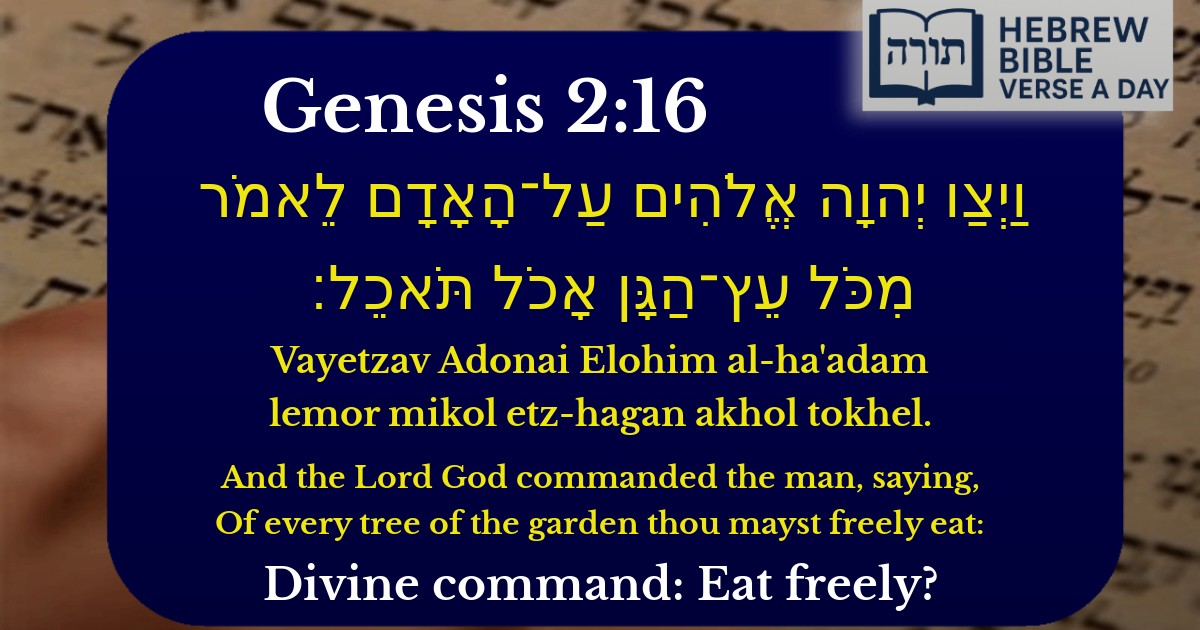Frequently Asked Questions
Q: What does Genesis 2:16 mean when it says 'Of every tree of the garden thou mayst freely eat'?
A: This verse means that Hashem granted Adam permission to eat from any tree in the Garden of Eden except for the Tree of Knowledge of Good and Evil (as stated in the next verse, Genesis 2:17). Rashi explains that this shows Hashem's kindness in providing abundant food for mankind.
Q: Why is Genesis 2:16 important in Jewish tradition?
A: This verse is important because it establishes the first commandment given to mankind. The Rambam (Maimonides) counts this as one of the 613 mitzvot - the positive commandment to eat from the trees of the Garden (Sefer Hamitzvot, Positive Commandment 1). It shows that even in paradise, humans need divine guidance.
Q: What lesson can we learn from Genesis 2:16 today?
A: We learn that everything in the world is given to us by Hashem for our benefit, but with boundaries. Just as Adam could eat from most trees but had restrictions, we must use the world's resources properly within Torah guidelines. The Midrash teaches this shows Hashem's generosity while expecting responsible behavior.
Q: How does Genesis 2:16 relate to the concept of free will in Judaism?
A: This verse sets up the test of free will by first granting permission to eat from most trees, then prohibiting one. The Talmud (Chagigah 15a) explains that true service of Hashem requires the ability to choose between following commandments or not. This verse begins that framework.
Q: Why does the Torah mention this permission before the prohibition in Genesis 2:17?
A: Rashi explains that Hashem first showed kindness by permitting many things before giving restrictions. This teaches that Judaism is primarily about enjoying the world properly, not about unnecessary restrictions. The prohibition comes only after establishing the abundance of what is permitted.


Rashi's Explanation
Rashi (Bereshit 2:16) explains that the phrase "מִכֹּל עֵץ־הַגָּן אָכֹל תֹּאכֵל" ("Of every tree of the garden thou mayst freely eat") emphasizes the permissibility of eating from all trees in Gan Eden except the Tree of Knowledge, which is mentioned in the next verse. The repetition of the verb "אָכֹל תֹּאכֵל" ("you may surely eat") underscores the abundance and freedom granted to Adam, reinforcing that Hashem's initial command was one of generosity and permission rather than restriction.
Rambam's Perspective
In Moreh Nevuchim (1:2), Rambam interprets this verse as highlighting the principle of free will. Hashem granted Adam the ability to choose between obedience and disobedience, setting the stage for the test of the Tree of Knowledge. The broad permission to eat from all trees except one establishes the framework for moral decision-making, a foundational concept in Jewish thought.
Midrashic Insights
Halachic Implications
The Kli Yakar (Bereshit 2:16) notes that the phrasing "וַיְצַו" ("And He commanded") is unusual for a positive instruction, as tzivuy (commandment) typically refers to prohibitions. He explains that this teaches that even permissible acts must be performed with intentionality and gratitude, recognizing them as gifts from Hashem. This aligns with the broader Jewish ethic of brachot (blessings) over permitted enjoyments.